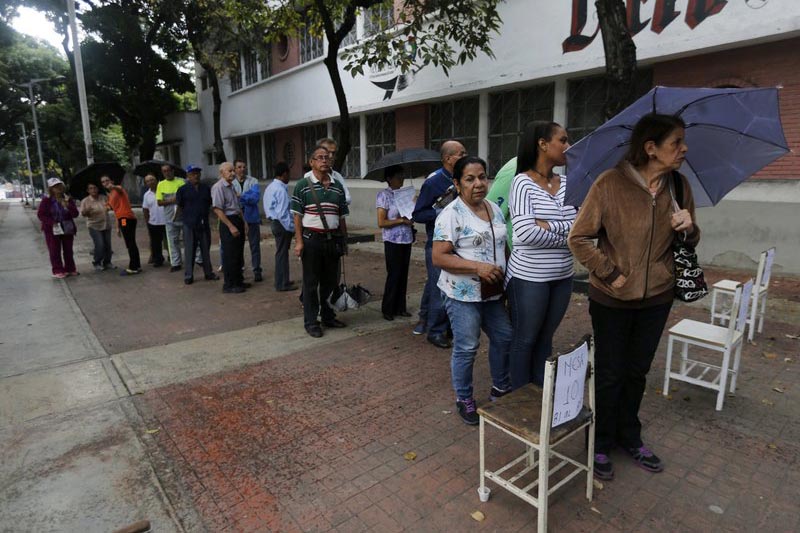Many Venezuelans skip polls to protest government vote
CARACAS: Venezuelans stayed away from the polls in huge numbers Sunday in a show of protest against a vote to grant President Nicolas Maduro’s ruling socialist party virtually unlimited powers in the face of a brutal socio-economic crisis and a grinding battle with its political opponents and groups of increasingly alienated and violent young protesters.
The government swore to continue its push for total political dominance of this once-prosperous OPEC nation, a move likely to trigger US sanctions and new rounds of the street fighting that has killed at least 125 and wounded nearly 2,000 since protests began in April.
Venezuela’s chief prosecutor’s office reported 10 deaths Sunday in clashes between protesters and police across the country. Seven police officers were wounded when a fiery explosion went off as they drove past piles of trash that had been used to blockade a street in an opposition stronghold in eastern Caracas.
A list of nations including Argentina, Canada, Colombia, Mexico, Panama, Paraguay, Spain, Great Britain and the United States said they would not recognize Sunday’s vote. The Trump administration again promised “strong and swift actions” against Venezuelan officials, including the 545 participants in the constitutional assembly, many of them low-ranking party members. The US did not say whether it would sanction Venezuelan oil imports, a measure with the potential to destabilize Maduro’s government and deepen the country’s humanitarian crisis.
Across this capital of more than 2 million people, dozens of polling places were virtually empty, including many that have seen hours-long lines of thousands voting to keep the government in power over the last two decades. At the Poliedro sports and cultural complex in western Caracas, several thousand people waited about two hours to vote, many drawn from opposition-dominated neighborhoods where polling places were closed. But at least three dozen other sites visited by The Associated Press had no more than a few hundred voters at any one time, with many virtually empty.
Opposition leaders had called for a boycott of the vote, declaring it rigged for the ruling party, and by late afternoon they were declaring the low turnout a resounding victory. Organizers said preliminary results from observers placed in nearly every Venezuelan municipality indicated a small fraction of the turnout seen in previous elections had voted.
“It’s very clear to us that the government has suffered a defeat today,” said Julio Borges, president of the opposition-controlled but largely powerless National Assembly. “This vote brings us closer to the government leaving power.”
Results had not been announced by late Sunday, but Diosdado Cabello, the ruling socialist party’s first vice president, proclaimed that there was a “record” turnout that would surprise the opposition. He called Sunday’s vote “a moral and ethical victory over the right wing.”
Maduro called the vote for a constitutional assembly in May after a month of protests against his government, which has overseen Venezuela’s descent into a devastating crisis during its four years in power. Thanks to plunging oil prices and widespread corruption and mismanagement, Venezuela’s inflation and homicide rates are among the world’s highest, and widespread shortages of food and medicine have citizens dying of preventable illnesses and rooting through trash to feed themselves.
The winners among the 5,500 ruling-party candidates running for 545 seats in the constituent assembly will have the task of rewriting the country’s constitution and will have powers above and beyond other state institutions, including the opposition-controlled congress.
Maduro made clear in a televised address Saturday that he intends to use the assembly not just to rewrite the country’s charter but to govern without limitation. Describing the vote as “the election of a power that’s above and beyond every other,” Maduro said he wants the assembly to strip opposition lawmakers and governors of constitutional immunity from prosecution — one of the few remaining checks on ruling party power.
Declaring the opposition “already has its prison cell waiting,” Maduro added: “All the criminals will go to prison for the crimes they’ve committed.”
He said the new assembly would begin to govern within a week, with its first task in rewriting the constitution to be “a total transformation” of the office of Venezuela’s chief prosecutor, a former government loyalist who has become the highest-ranking official to publicly split from the president.
“People aren’t in agreement with this,” said Daniel Ponza, a 33-year-old drywall contractor, as he watched a few dozen people outside a polling place in El Valle, a traditional stronghold of the ruling Chavista movement in western Caracas. “People are dying of hunger, looking for food in the trash. And I think this is just going to make things worse.”
Still, for many others, the looming likelihood of authoritarian government was appealing after months of street blockades and street clashes.
Sculptor Ricardo Avendano traveled from the opposition-dominated eastern neighborhood of Las Mercedes to vote at the Poliedro sports and cultural complex, saying the government needed total power to control food prices and shut down protests.
“The most important thing is imposing order,” he said. “If I’d been president there wouldn’t be protesters in the streets. They’d be prisoners.”
The government was encouraging participation in Sunday’s vote with tactics that included offering social benefits like subsidized food to the poor and threatening state workers’ jobs if they didn’t vote.
“I’m here because I’m hoping for housing,” Luisa Marquez, a 46-year-old hairdresser, as she waited to vote in eastern Caracas.
Cabello, the socialist party leader, said Venezuela was undeterred by the mounting international pressure. Remarking that Venezuela has decided to be free from foreign meddling, he said, “What do we care what the world thinks?”
Ahead of Sunday’s vote, the opposition organized a series of work stoppages as well as a July 16 protest vote that it said drew more than 7.5 million symbolic votes against the constitutional assembly.
Opposition leader Henrique Capriles called on Venezuelans to protest again Monday.






